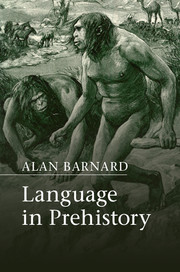Book contents
- Frontmatter
- Dedication
- Contents
- List of figures
- List of tables
- Preface
- 1 Introduction
- 2 Population diversity and language diversity
- 3 What did prehistoric people do?
- 4 How did prehistoric people think?
- 5 Narratives of the every-day
- 6 Mythological narratives
- 7 Sexual selection and language evolution
- 8 Conclusions and thoughts for the future
- Glossary
- References
- Index
2 - Population diversity and language diversity
Published online by Cambridge University Press: 05 November 2015
- Frontmatter
- Dedication
- Contents
- List of figures
- List of tables
- Preface
- 1 Introduction
- 2 Population diversity and language diversity
- 3 What did prehistoric people do?
- 4 How did prehistoric people think?
- 5 Narratives of the every-day
- 6 Mythological narratives
- 7 Sexual selection and language evolution
- 8 Conclusions and thoughts for the future
- Glossary
- References
- Index
Summary
Language is often rich in symbolism and varied in things like word order and grammatical complexity. Such variation is necessary for the ways in which language is actually used: for simile and metaphor, for deception, for making up riddles, for telling stories (whether true or fictional), for making jokes and for idle chit-chat, as well as for imparting knowledge. We know that language as it exists today among non-hunter-gatherers was actually developed within not only non-literate but also foraging communities, and certainly not in technologically advanced ones (see Barnard 2012: 90–1). It is wise therefore always to keep our origins as foragers or hunter-gatherers in mind.
It may also be appropriate to reflect too on the fact that hunter-gatherers can be nearly as diverse as languages. There are, of course, many similarities among hunter-gatherer peoples, for example, in their sharing practices, their lack of or reluctance to accumulate property, their extensive kinship networks, their tendency to occupy large areas and their relatively simple technologies. Yet the differences can be considerable too, as Robert Kelly (2013 [1995]), among others, has demonstrated. Many hunter-gatherers are ‘immediate-return’ in economic structure, but ‘delayed-return’ hunter-gatherers, that is, those who store things or otherwise plan for the future, are found as well (Woodburn 1980, 1982). There exist both egalitarian hunter-gatherers (which is most of them) and non-egalitarian groups: Northwest Coast peoples, Ainu and presumably prehistoric groups evolving social complexity. The last category includes, for example, the prehistoric peoples of Europe in their long evolution towards the Mesolithic and its social complexity. There are also diverse kinship structures, mainly cognatic but occasionally matrilineal, and in the case of Australia mainly patrilineal. These entail very different ways of thinking about people and about kin relationships. In short, although hunter-gatherers are one kind of society, there are different sorts of ‘hunter-gatherers’. Also, in the distant past there were hominins who were vegetarians. Not all creatures who gathered food were hunter-gatherers, though since the earliest days of Homo sapiens they were. As archaeologist Mark Pluciennik (2014: 55) points out, the category hunter-gatherer was invented in relation to Western, economic concerns: ‘nascent capitalism, property rights, colonial practices and attitudes, and as part of the developing Enlightenment and scientific passion for classification’. Yet that, of course, does not make it a non-category, but rather a necessary category of its time.
- Type
- Chapter
- Information
- Language in Prehistory , pp. 17 - 32Publisher: Cambridge University PressPrint publication year: 2016



